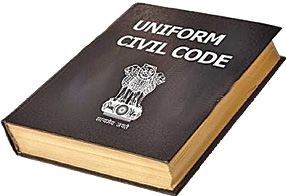 Over the past couple of months, the media has been abuzz about the current Government’s inclination towards implementing the ‘Uniform Civil Code’ or UCC in India. A UCC calls for homogenous or standardized administration – that is, administering the same set of secular civil laws to govern all people belonging to different religions and regions – basically streamlining governance of minorities like Parsis, Muslims and Christians, which are governed by their own set of personal laws. The common areas covered by a civil code include personal status, rights related to acquisition and administration of property; and rights related marriage, divorce and adoption.
Over the past couple of months, the media has been abuzz about the current Government’s inclination towards implementing the ‘Uniform Civil Code’ or UCC in India. A UCC calls for homogenous or standardized administration – that is, administering the same set of secular civil laws to govern all people belonging to different religions and regions – basically streamlining governance of minorities like Parsis, Muslims and Christians, which are governed by their own set of personal laws. The common areas covered by a civil code include personal status, rights related to acquisition and administration of property; and rights related marriage, divorce and adoption.
On the 7th October, 2016, the Law Commission of India, hoping to engage in healthy conversation about the viability of Uniform Civil Code, notified a questionnaire inviting the public to give their views for the revision and reform of the Family Laws, as the Article 44 of the Constitution, which provides that “The State shall endeavor to provide for its citizens a Uniform Civil Code throughout the territory of India.” The questionnaire solicits opinions of the public at large about the ways in which family law reforms could be introduced in the most integrative manners, that does not compromise the diversity and the plurality that constitutes the core of Indian fabric. Those willing to participate could present their views within 45 days to the Law Commission of India by emailing him at lci-dla@nic.in or via postal service Law Commission of India, 14th Floor, H.T. House, Kasturba Gandhi Marg, New Delhi -110001
 Pros and Cons: One of the main advantages of the UCC is that it will simplify the cumbersome legal process governed by personal laws and especially promote gender justice and equality by removing inbuilt gender injustices of personal laws against women regarding personal laws on rights, divorce and maintenance. It will champion national integration based on justice and equality for all by incorporating similar laws for all citizens. On the flipside, it is argued that implementing the UCC will impinge on India’s cultural diversity and that India should not blindly copy the West’s positivism-centered legal trajectory. Also, the continuing personal law system can handle the potential inequality through the intricate process of gradual harmonization of Indian personal laws. Minority groups also face the insecurity of complete loss of identity and marginalization within Indian society.
Pros and Cons: One of the main advantages of the UCC is that it will simplify the cumbersome legal process governed by personal laws and especially promote gender justice and equality by removing inbuilt gender injustices of personal laws against women regarding personal laws on rights, divorce and maintenance. It will champion national integration based on justice and equality for all by incorporating similar laws for all citizens. On the flipside, it is argued that implementing the UCC will impinge on India’s cultural diversity and that India should not blindly copy the West’s positivism-centered legal trajectory. Also, the continuing personal law system can handle the potential inequality through the intricate process of gradual harmonization of Indian personal laws. Minority groups also face the insecurity of complete loss of identity and marginalization within Indian society.
Impact of UCC On The Parsi Community: As far as the Parsi community is concerned, the UCC would impact two areas – Adoption; and Rights of Intermarried Ladies (under the Special Marriages Act) who desire to continue to profess the religion of their birth and raise their children as Parsis. Needless to mention, this will elicit contradicting reactions – commendation from some and condemnation from others. Parsi Times will continue to keep its readers in the loop…
- તમે ઇન્જેક્શન આપેલા તરબૂચ તો નથી ખાઈ રહ્યા ને? - 27 April2024
- પિતાના હાથની છાપ.. - 27 April2024
- વિસ્પી ખરાડી ફિટ ઈન્ડિયા મૂવમેન્ટનાબ્રાન્ડ એમ્બેસેડર તરીકે નિયુક્ત - 27 April2024
